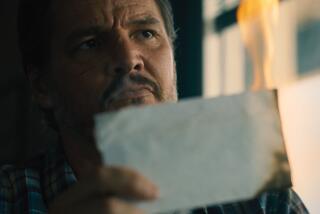MOVIE REVIEW : A MERCURIAL QUALITY IN ‘QUICKSILVER’
- Share via
“Quicksilver” (San Diego area theaters) plunges us into one of those semitribal worlds (like those of truckers or motorcycle gangs) that movies thrive on: in this case, a world of big-city bicycle messengers.
The cyclists here are fleet racers with nerves of ice--rabbits on wheels, ripping through The City’s monolithic machinery and smoke--threading their way though the exhaust-choked streets, swerving between trucks and cars. We see this world through the eyes of a semi-outsider: young ex-options trader Jack Casey (Kevin Bacon), who ruins himself--and, almost, his parents--one luckless day at the stock exchange, and has to drop out, and down, to find himself.
The movie sometimes has tremendous visual excitement. First-time writer-director Tom Donnelly often makes his scenes--particularly when the cyclists hit the streets--boil with energy.
But, if you think a few moments, you can quickly predict what Jack will find on his voyage to the underside: a rowdy, congenial multiracial gang of colorful, wisecracking pros (named Voodoo, Apache, Tiny and Shorty); a few hoods to bully him or test his will; and a pretty streetwise female rider, aflame with sex hostility. You know there’ll be a race of some kind, and a car wreck (when you see the car, you may guess it won’t last through the movie). You might even predict the dope-dealing villain, Gypsy, or the afternoon when Jack strides back into the Pacific Stock Exchange, with the life savings of his Chicano buddy, Hector (Paul Rodriguez) who only wants to open a hot-dog cart.
What you might not guess is that Jack Casey--after he drops out of society--will be sharing a huge loft with a rich, blond ballerina who drags him to art openings; or that, after witnessing the hit-and-run murder of a fellow rider, he’ll stay mum for the entire film. (But then, a movie should always have a few offbeat wrinkles.)
The cyclist’s world has real enough counterparts--this band of rugged individualists, living by their own codes in the city’s shadows--and it’s been recorded, often, by journalists. But here, we’re mostly somewhere else: in the world of “Flashdance” dreams and “Footloose” rebellion--larger and prettier than life, and emptier.
“Quicksilver” is a movie divided against itself. It keeps dodging around with such faltering adroitness between celebrating the outsider and celebrating success that it ends up celebrating nothing much at all, except perhaps its own kineticism, gloss and speed.
This is a film about dropping out of the rat race and finding yourself, spiritually, on the underside--but it seems to have been made by people who don’t believe part of their own theme, who feel that winning, and rising up, are the major things in life.
The movie’s only charged sense of loss or grief comes when Jack accidentally sees his stoic, lower-middle-class father, sobbing at the table. Like most modern screenplays, “Quicksilver’s’ ” has no real internal logic (by the end--Gypsy’s kill-crazy spree and the cliffhanger climax--it’s gotten rid of external logic, too).
In a way, it’s a shame. Even if you can’t respect Donnelly’s writing, his direction has assurance, juice, energy and lots of movement. And the actors--Rodriguez, Rudy Ramos, Larry Fishburne and Whitney Kershaw as well as Bacon--play with so much body English and physical presence they make many of the scenes come alive. The movie is like the bikers; it’s best and freest when it’s just racing ahead. Whenever it stops, you ask too many questions.
More to Read
Only good movies
Get the Indie Focus newsletter, Mark Olsen's weekly guide to the world of cinema.
You may occasionally receive promotional content from the Los Angeles Times.









